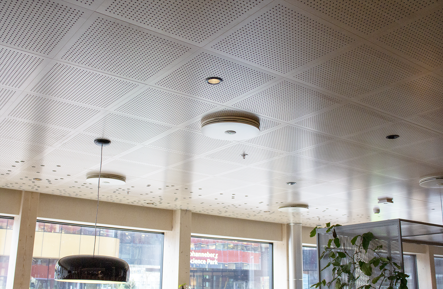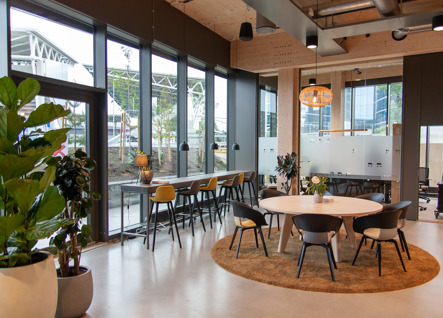What is an office?
Office buildings are often known as multifaceted entities, normally presenting desks in a certain arrangement. It has been the place where a majority of the work-load has been done and where most employees have spent many of their waking hours. Today, offices can look a little different, and its location has become a subject of discussion as work-place mobility and hybrid working models are part of a new normal. Learn more about trends and ideas for future offices.
Read more here
We are primarily indoors
By the time we are 80, we have spent 72 years inside. How pleased we are with our lives at that time highly depends on the quality of the indoor climate. Not only are indoor environments used for rest and recuperation but many work assignments and the most important decisions are generally made indoors. An office needs to allow for productivity, strategic thinking and comfort in the interest of employees and of tenants for them to be willing to stay, and pay.
Learn more in our indoor climate guide
No office is the other alike
As said in the introduction to this guide, there are numerous choices to make when designing an HVAC solution for a good indoor climate. In the case of an office, working hours, job activities and occupancy rates are factors that impact on the available alternatives. Further parameters that highly affect the choices that have to be made are building characteristics, planned office layout, and expected future developments of the property.
When the above is clearly specified, it will be significantly easier to cope with the options described throughout this guide. However, we believe it is not only a matter of finding answers to certain inquiries, office buildings are complex applications and we believe it is vital to find good partnerships with knowledgeable and experienced people. People who can answer questions and propose applicable solutions to the needs of the specific project, and preferably, someone who can follow the project from the initial design stages to a complete building, and beyond.
Contact us, we are here to help
Space efficiency
Space is a critical factor no matter if the property is a new-build or a renovation project. When constructing new buildings one of the main concerns in relation to space is to settle a design that allows for as much high priced rentable floor area as possible. When it comes to a renovation project, the building structure generally sets the terms for how an HVAC solution can be built-in. In both cases there are a number of approaches to fit in a solution for ventilation, heating and/or cooling, but it is key to be perceptive and balance all alternatives.
Read more
Sustainability is more than energy-efficiency
Sustainability is a multi-facetted term in regards to HVAC. The most prominent topic is perhaps energy efficiency as the building sector is responsible for about 40% of the energy consumption world-wide and as roughly 75% of the building stock in Europe is considered energy inefficient. With that said, a number of HVAC-related actions are directly aimed towards a reduction of energy-use, however increased longevity and care for the environment is also fundamental for a better tomorrow.
With that said, it is key to tackle the many facets of sustainability, but be aware that the indoor climate needs to remain the focal point for health, comfort and well-being of the people inside. A tenant who is dissatisfied because employees are complaining about the indoor climate, will not be long-lasting.
More to know
Buildings have a long life
Many of the buildings standing today will also be standing in twenty years from now. Buildings that are currently being constructed will be in place for at least fifty years, maybe a hundred. The way a building is used will most certainly change during the time it stands, which is something to prepare for in the early stages of a construction or renovation process.
From the many perspectives of sustainability it is obviously important to be able to adjust, reuse and update an HVAC-solution to not throw something out that actually works, and thereby put unnecessary strain on the environment. It is essential to consider a solution for ventilation, heating and cooling that is designed for reasonable alternative uses of the building. Renovation and adaptability expenses, as well as rent revenues and satisfied tenants are at stake.
LEARN MORE HERE
Economic aspects of an office
The economic aspects of an office can perhaps be narrowed down and limited to the mechanism of charging the highest possible rent per square meter with the least possibe cost. But, this guide is puting the light on the essential balance between a functional HVAC-solution that delivers on the many perspectives of sustainability and a good indoor climate for long-term tenants. When looking at that balancing act from an office perpective, the conditions are far more complex and the economic opportunities not always and "easy" equation.
Read more
Conclusive remarks
“It is vital to carefully consider different solutions and keep the right one based on each project’s uniqueness. In that process it is key to rely on a long term partner able to understand the project as a whole and provide technical experts as well as service technicians to install, commission, monitor and maintain the products throughout the building’s life”
Xavier Marlier, Chief Sales Officer, Swegon Group
Explore further
No matter if this guide has been briefly read or researched thoroughly, this section gathers further interesting topics. We present our offer and share our knowledge and expertise.

